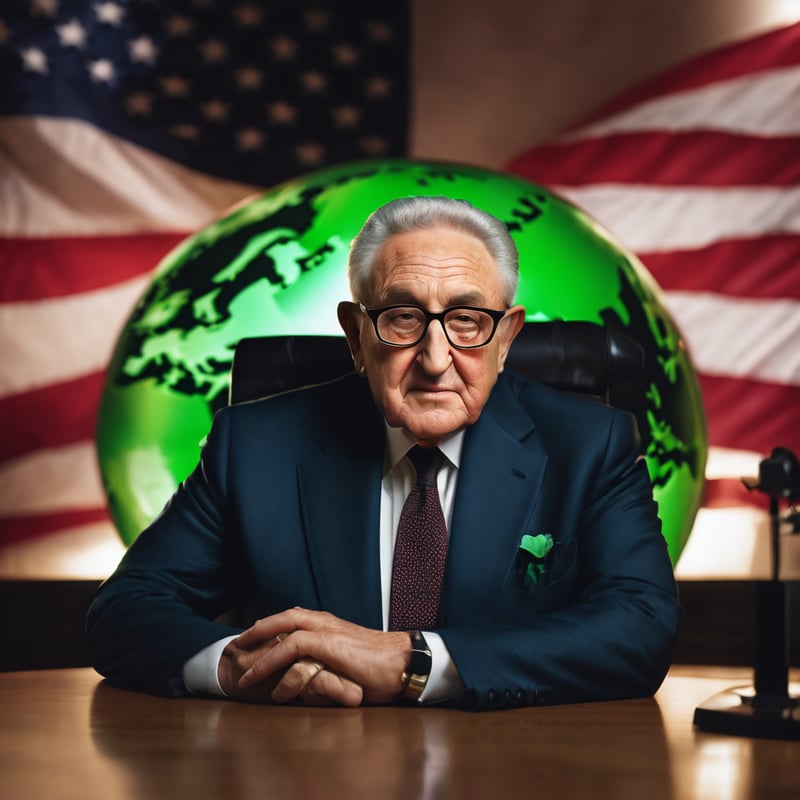Henry Kissinger, former Secretary of State, Nobel winner died at 100
@theus
1 year ago

Henry Kissinger, former Secretary of State, Nobel winner died at 100
Henry Kissinger, one of the most influential and controversial figures in American foreign policy, died on Wednesday at his home in Connecticut, according to his consulting firm. He was 100 years old.
Kissinger served as national security adviser and secretary of state under Presidents Richard Nixon and Gerald Ford, and played a key role in shaping U.S. relations with China, the Soviet Union, the Middle East, and Southeast Asia. He was also a prolific author, a Nobel Peace Prize laureate, and a political scientist who pioneered the concept of Realpolitik.
Biography
Kissinger was born Heinz Alfred Kissinger in Fürth, Germany, on May 27, 1923, to a Jewish family. He and his family fled Nazi persecution in 1938 and immigrated to the United States, where he became a naturalized citizen in 1943. He served in the U.S. Army during World War II, and later graduated from Harvard University with a Ph.D. in political science in 1954.
He joined the faculty of Harvard as a professor, and became an adviser to several presidents and policymakers on foreign affairs. In 1969, he was appointed as national security adviser by Nixon, and in 1973, he became secretary of state, a position he held until 1977. He continued to be an influential voice on international issues, and founded his own consulting firm, Kissinger Associates, in 1982.
Accomplishments
Kissinger is widely regarded as a master of diplomacy and statecraft, who helped shape the course of history in the second half of the 20th century. Some of his major accomplishments include:
- - Negotiating the opening of diplomatic relations with China in 1972, which paved the way for the normalization of ties between the two countries and the integration of China into the global system.
- - Pursuing the policy of détente with the Soviet Union, which eased the tensions of the Cold War and led to several arms control agreements, such as the Strategic Arms Limitation Talks (SALT) and the Anti-Ballistic Missile Treaty (ABM).
- - Engaging in shuttle diplomacy in the Middle East, which helped end the Yom Kippur War in 1973 and brokered the disengagement of forces between Israel and Egypt and Syria.
- - Negotiating the Paris Peace Accords in 1973, which ended the U.S. military involvement in the Vietnam War and paved the way for the reunification of Vietnam.
- - Receiving the Nobel Peace Prize in 1973, along with Le Duc Tho of North Vietnam, for their efforts to end the Vietnam War. (Le Duc Tho declined the prize, citing the ongoing conflict in Vietnam.)
- - Supporting the independence of Bangladesh from Pakistan in 1971, and the transition of Portugal's African colonies to self-rule in 1974-1975.
- - Promoting human rights and democracy in Latin America, Africa, and Asia, and opposing the spread of communism and terrorism.
Political scientist
Kissinger was also a renowned political scientist, who contributed to the theory and practice of international relations. He was influenced by the ideas of realism, which emphasize the role of power, interests, and security in world politics. He also drew insights from history, philosophy, psychology, and other disciplines, to understand the complex and dynamic nature of global affairs.
Some of his main concepts include:
- - The balance of power, which refers to the distribution of capabilities among states, and the need to maintain a stable equilibrium that prevents any one state from dominating others.
- - The triangular diplomacy, which refers to the strategic interaction among three major powers, namely the U.S., China, and the Soviet Union, and the use of leverage and incentives to influence their behavior and alignment.
- - The linkage, which refers to the connection of various issues and regions, and the use of trade-offs and bargains to achieve multiple objectives and resolve conflicts.
- - The constructive ambiguity, which refers to the use of vague and flexible language and terms, and the avoidance of explicit commitments and details, to facilitate negotiations and agreements.
Books
Kissinger was also a prolific author, who wrote dozens of books and articles on various topics related to foreign policy, history, and strategy. Some of his most notable books include:
- - A World Restored (1957), which analyzes the Congress of Vienna and the restoration of the European order after the Napoleonic Wars.
- - Nuclear Weapons and Foreign Policy (1957), which examines the implications of nuclear weapons for international security and strategy.
- - Diplomacy (1994), which traces the history of diplomacy from the 17th century to the present, and offers a critique of the post-Cold War world order.
- - On China (2011), which explores the history and culture of China, and the evolution and future of U.S.-China relations.
- - World Order (2014), which surveys the different conceptions and challenges of world order, and proposes a vision for a more peaceful and stable global system.
Conclusion
Henry Kissinger was a towering figure in American foreign policy, who left a lasting legacy and impact on the world. He was a visionary and a pragmatist, a realist and an idealist, a scholar and a statesman. He was admired and respected by many, but also criticized and condemned by some. He was a man of contradictions and complexities, who shaped and witnessed the triumphs and tragedies of his time. He was, in his own words, "a witness to history".
You may also like:
D o you want to connect with people who share your interests, passions, and goals? Do you want to express yourself, showcase your talents, and discover new opportunities? Do you want to enjoy a safe and enjoyable platform that offers everything you need for your daily computing needs? If you answered yes to any of these questions, then you should join NXplan.com, the new all-in-one social platform that features blog, messaging, chat, inbox, and marketplace.
NXplan.com is more than just a social network.
It’s a social ecosystem that allows you to create, communicate, and collaborate with others in a variety of ways. You can:Create your own blog and share your thoughts, opinions, and experiences with the world. You can also follow other bloggers and get inspired by their content. Message your friends and family and stay in touch with them. You can also make new friends and join groups that match your interests.
Chat with other users and have fun conversations. You can also join live events and webinars and learn from experts and influencers. Manage your inbox and organize your emails. You can also send and receive files, photos, and videos with ease. Explore the marketplace and find products and services that suit your needs. You can also sell your own products and services and earn money.
NXplan.com is designed to provide you with a safe and enjoyable platform that respects your privacy and security.
You can: Control your own data and decide who can see and access your information. Report and block any abusive or inappropriate content or users. Enjoy a spam-free and ad-free environment that does not track or sell your data. Access the platform from any device and any browser, without any downloads or installations. NXplan.com is free to join and use, and you can get started in minutes. All you need is a valid email address and a password. You can also customize your profile and settings to make it your own.Ready to give it a try?
Join NXplan.com today and discover a new way of socializing online. You’ll be amazed by what you can do and who you can meet on NXplan.com. Don’t miss this opportunity to join the next big thing in social media. Register now and start your NXplan journey.Technology is nothing. What's important is that you have a faith in people, that they're basically good and smart, and if you give them tools, they'll do wonderful things with them




